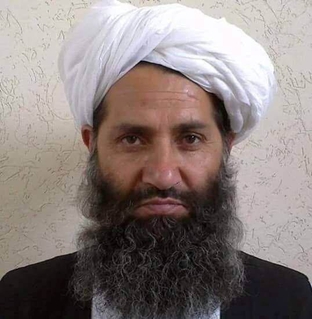|
| “ | Every opportunity for the establishment of an Islamic system, peace and security that presents itself will be made use of by the Islamic Emirate. We fully assure neighboring, regional, and world countries that Afghanistan will not permit anyone to pose a security threat to any other country using our soil. | „ |
| ~ Hibatullah Akhundzada |
Hibatullah Akhundzada (Pashto: هبت الله اخونزاده; Arabic: هبة الله أخوند زاده Haibatullāh Aḫūnd Zādah; born 1961) is an Afghani Militant Islamic scholar who is the current Supreme Leader of the Taliban, assuming leadership of the organization following the death of Akhtar Mansour. Following the Taliban's capture of Kabul on August 15, 2021, he is also the de facto state leader of Afghanistan.
Akhundzada reportedly issued the majority of the Taliban's fatwas, and was the head of the Taliban's Islamic courts. The Taliban also bestowed upon Akhundzada the title Emir-al-Momineen ("Commander of the Faithful") that his two predecessors had carried.
Biography edit
Akhundzada was born in 1961 in the Panjwayi district of Kandahar Province in the Kingdom of Afghanistan. A Pashtun, he belongs to the Noorzai clan or tribe. His first name, Hibatullah, means "gift from Allah" in Arabic. His father, Mullah Mohammad Akhund, was a religious scholar as well as the imam of their village mosque.
In the 1980s, Akhundzada was involved in the resistance against the Soviet military campaign in Afghanistan. When the Afghan Taliban captured the capital Kabul in 1996, one of religious scholar Akhundzada's first jobs was in Farah Province as a member of the Department of the Promotion of Virtue and the Prevention of Vice paramilitary enforcers. He later moved to Kandahar and was made an instructor at the Madrasa, the seminary of about 100,000 students that Mullah Omar personally looked after.
Mawlawi Akhundzada was later appointed as Chief Justice of the Shariah Courts of the Islamic Emirate of Afghanistan. Rather than a warlord or military commander, he has a reputation as a religious leader who was responsible for issuing most of the Taliban's fatwas and settling religious issues among members of the Taliban. He is believed to have issued rulings in support of Islamic punishments - such as public executions of convicted murderers and adulterers and amputations of those found guilty of theft.
Both Mullah Omar and Mullah Mansour are known to have consulted Akhundzada on matters of fatwa. Unlike his predecessors who were educated in Pakistan—and who were also believed to have moved permanently east across the Durand Line after the U.S. invasion in 2001 and during the resulting war—Akhundzada is believed to have lived in Afghanistan throughout the 2001–2016 period with no travel record, though he has close ties with the Quetta-based Taliban Shura.
After his promotion to deputy leader of the Taliban in 2015, Akhundzada put in place a system under which a commission would be formed under the shadow governor in every province that could investigate abusive commanders or fighters, according to Mullah Abdul Bari, a Taliban commander in Helmand.
Akhundzada was appointed as the Taliban supreme commander on 25 May 2016 as the replacement for Mullah Akhtar Mansour. Mansour and a second militant were killed when munitions fired from a drone hit the vehicle in which they were riding. The strike was approved by U.S. President Barack Obama.
Akhundzada was previously a deputy for Mansour. According to sources from the Taliban, Mansour had already named Akhundzada as his successor in his will. A Taliban spokesman stated that Sirajuddin Haqqani was named first deputy and Mullah Mohammad Yaqoob, the son of former Taliban leader Mullah Omar, was named second deputy. Mawlawi Akhundzada leads a number of madrassas, or religious schools, in Pakistan's southwestern Balochistan province.
Analysts believe that there were differences among Taliban ranks on who should be appointed the new chief. The suggested names were Mullah Yaqoob and Sirajuddin Haqqani, the latter being the most prominent member linked with the Haqqani Network. Akhundzada, however, has sustained a neutral identity among the Taliban rank and file. To avoid conflict upon choosing Akhundzada as chief, the Taliban agreed that Yaqoob and Sirajuddin Haqqani will both work as his deputies. Mullahs Abdul Razaq Akhund and Abdul Sata Akhund pledged their support to Emir Akhundzada in December 2016.
Yousef Ahmadi, one of the Taliban's main spokesmen, stated on 20 July 2017 that Akhundzada's son Abdur Rahman was killed while carrying out a suicide attack on an Afghan military base in Gereshk in Helmand Province. An Afghan government official said that they were investigating the incident but could not confirm if Rahman was killed.
In August 2019, Akhundzada's brother Hafiz Ahmadullah was killed in a bomb blast. Ahmadullah succeeded Akhundzada as leader the Khair Ul Madarais mosque, which had served as the main meeting place of the Quetta Shura, after Akhundzada was appointed as the Taliban emir. More of Akhundzada's relatives were later confirmed to have died in the blast as well.
In the summer of 2021, forces under Akhundzada's nominal command began a general offensive seeking to achieve a final victory in the war.
On 15 August, the Associated Press reported that the Taliban had reached and captured Kabul; thus, the Islamic Republic of Afghanistan's government fell. The Taliban said that they were awaiting a "transfer" of power. On 15 August, following the near seizure of the capital, the Taliban occupied the Presidential Palace after the incumbent President Ashraf Ghani fled the country to Tajikistan. A second Islamic Emirate was officially declared on August 19.
On 18 August, it was announced that based on the general amnesty issued by Akhundzada, “it was decided to release political detainees from all prisons of Afghanistan”. By the time, the Taliban has already taken control of key prisons across the country and freed thousands of inmates, including ISIS fighters, Al-Qaeda members and senior Taliban figures.
